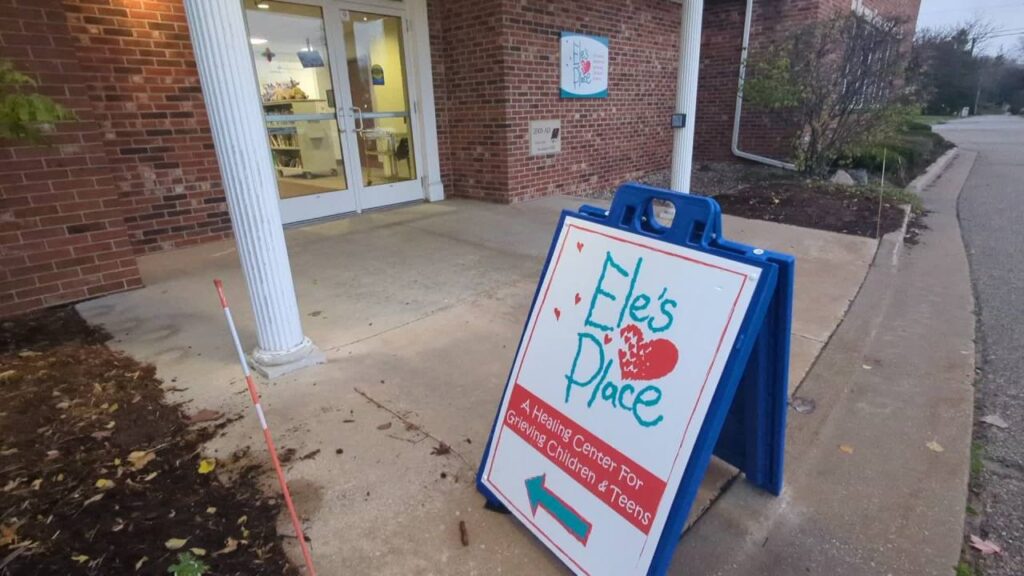GRAND RAPIDS, Mich. (WOOD) — A child in Kent County had nightmares after losing her parent to a drug overdose because she didn’t know how the parent died and imagined someone must have broken into the house and killed them.
Karen Ketterer, the program director for Ele’s Place in Grand Rapids, recalled that situation as a common scenario for children of deadly overdose victims.
“It can be a really difficult conversation for parents to have with kids, and that can cause more anxiety and uncertainty for kids as far as not understanding why their person is dead,” Ketterer said.
Ele’s Place is a nonprofit, community-based organization dedicated to creating awareness about and support for grieving children, teens and their families. It offers a number of program, including support groups.
The death of a parent can be an isolating experience in and of itself, but especially when that death was due to overdose.
“Due to the prevalence of substance use deaths, they’re very likely to have another child within their group that have experienced that as well,” Ketterer said.
Researchers at Wayne State University and the University of Michigan are getting a better understanding of how many children in Michigan could use these types of services and whether they have access to them.
Luisa Kcomt, Ph.D., a professor at Wayne State, and researchers at U-M formed a nonprofit called HopeHQ to identify what they call “child bereavement service deserts” in the state.
“Really, our mission is to ensure that no child who has experienced a parental drug overdose death grieves alone,” Kcomt said, “and to explain to people that the unique dynamics related to this type of loss, the stigma that these families often experience and try to break down the barrier so that they can feel more open to asking for help.”
HopeHQ data (PDF) shows more than 10,000 children in Michigan have lost a parent to an overdose death, including more than 1,600 children in West Michigan. The West Michigan counties with the highest rate of parental loss due to overdose are Muskegon and Calhoun, though Calhoun and Kent counties have the worst ratios of children experiencing this type of loss compared to bereavement services.
Not all agencies that offer bereavement services tailor them to children and families, especially those dealing with an overdose death.
“Michigan has a higher than national average of children who have experienced this type of loss,” Kcomt pointed out.
Understanding the data about overdose deaths and the impact on children can help service providers know where to focus their efforts and create options for people that are within reach.
“We need to work harder to get services right where kids are, That’s why (Ele’s Place is) in schools,” Ketterer said. “But there are other partnerships that need to be made with community centers, with identity-based centers that will offer help for people to get grief support in the places where they are most comfortable, because sometimes it doesn’t feel comfortable to come outside of your community.”
“What happens in silence is people suffer in silence, and they don’t get the support that they need. And then those kids don’t know what to do with all of those feelings,” she continued.
In addition to support groups for children, Ele’s Place has groups for caregivers and space for the whole family to come together and learn the language of grief. In the case of the child having nightmares, Ketterer said the imagined scenario of someone breaking into the house came out during one of the support group sessions.
“We were able to work with the family so that they felt comfortable talking to their child about what happened. We gave them the language to talk to a 6-year-old about what it means, that their parent took a substance and that substance made their body stop working, and that’s actually a lot less scary to hear than to have all the questions in their mind,” Ketterer said. “That family is doing remarkably well. We’ve gone past childhood into the teen years and she’s doing great.”
HopeHQ researchers have submitted several research papers for peer review and expect to have them published by the end of the year. They are also working with researchers in other states, sharing their process of working with the State of Michigan Vital Statistics Department to mine data on overdose deaths and connect those names to birth certificates, effectively mapping out where there are children who could be in dire need of support services.






